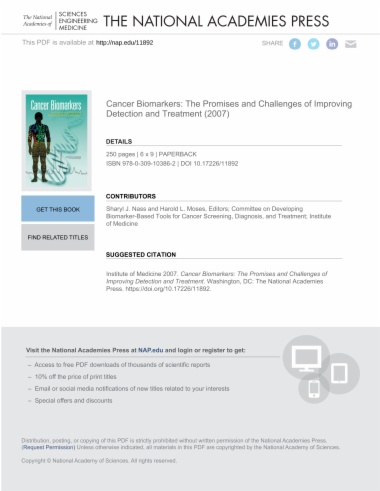Many cancer patients are diagnosed at a stage in which the cancer is too far advanced to be cured, and most cancer treatments are effective in only a minority of patients undergoing therapy. Thus, there is tremendous opportunity to improve the outcome for people with cancer by enhancing detection and treatment approaches. Biomarkers will be instrumental in making that transition. Advances in biotechnology and genomics have given scientists new hope that biomarkers can be used to improve cancer screening and detection, to improve the drug development process, and to enhance the effectiveness and safety of cancer care by allowing physicians to tailor treatment for individual patients—an approach known as personalized medicine. However, progress overall has been slow, despite considerable effort and investment, and there are still many challenges and obstacles to overcome before this paradigm shift in oncology can become a reality.
- Cover
- Front Matter
- Summary
- 1 Introduction
- 2 Methods, Tools, and Resources Needed to Discover and Develop Biomarkers
- 3 Guidelines, Standards, Oversight, and Incentives Needed for Biomarker Development
- 4 Methods and Process Needed for Clinical Adoption and Evaluation of Biomarker-Based Diagnostics
- Acronyms and Glossary
- Appendix: Developing Biomarker-Based Tools for Cancer Screening, Diagnosis,and Treatment: The State of the Science, Evaluation, Implementation, and Economics, Workshop Summary--Margie Patlak and Sharyl Nass, Rapporteurs

